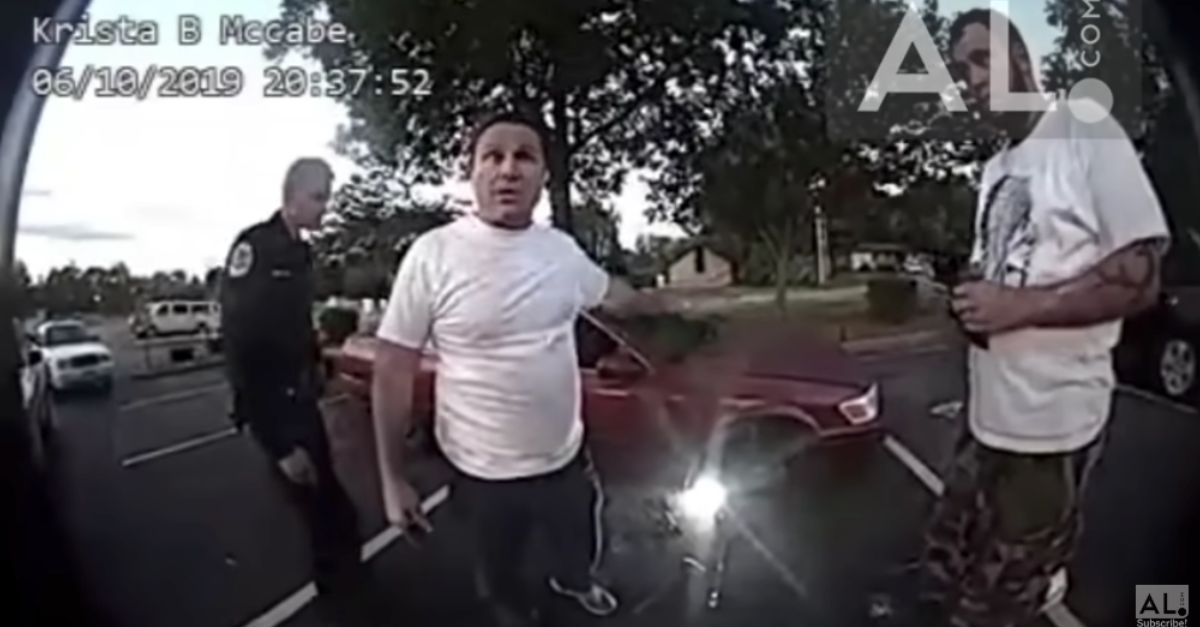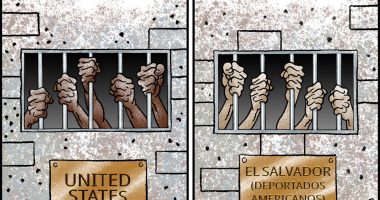
In this screengrab from an officer’s bodycam video, mechanic Roland Edger is seen talking to police. Edger and his stepson were changing a client’s tire in a church parking lot when Edger was arrested for his refusal to produce identification as requested by officers. A federal appeals court later ruled that Edger was within his legal rights to refuse and that the officers involved are not immune from a civil rights lawsuit for violation of Edger’s Fourth Amendment rights. (screengrab via YouTube/AL.com)
A federal appeals court ruled that two Alabama cops who arrested a mechanic for refusing to produce identification are not entitled to immunity from a civil lawsuit.
“The police are free to ask questions, and the public is free to ignore them,” U.S. Circuit Judge Charles Wilson of the 11th Circuit Court of Appeals bluntly said in a ruling issued last week.
The officers’ body camera and dashcam videos captured the entire encounter that unfolded in a church parking lot in Huntsville.
Roland Edger is an auto mechanic in Huntsville who had performed service on vehicles owned by Kajal Ghosh. Ghosh’s car broke down in 2019 while his wife had been using it to drive to her job at the Progressive Union Missionary Baptist Church. Ghosh called Edger and asked him to come and fix the car; he said the car would be in the church parking lot and the keys would be waiting for him in the church’s front office.
Edger checked on the car the same afternoon, then returned that evening with proper tools, accompanied by his stepson. Just after 8 p.m., a security guard saw Edger working on the car and called 911 to report “two Hispanic males, messing with an employee’s car.”
Shortly thereafter, Officer Krista McCabe reported to the scene and had the following exchange with Edger:
Officer McCabe: What are y’all doing?
Mr. Edger: Getting the car fixed.
Officer McCabe: Is this your car?
Mr. Edger: Yeah, well, it is one of my customer’s.
Officer McCabe: One of your customer’s?
Mr. Edger: Ghosh Patel, yep. I was over here earlier
Edger continued working on the car and another officer, Cameron Perillat, arrived on the scene. McCabe and Edger then had the following exchange:
Officer McCabe: Alright. Take a break for me real fast and do y’all have driver’s license or IDs on you?
Mr. Edger: I ain’t going to submit to no ID. Listen, you call the lady right now. Listen I don’t have time for this. I don’t mean to be rude, or ugly, but . . .
Officer McCabe: Okay. No, you need to—
Mr. Edger: I don’t mean to be—
Officer McCabe: —give me your ID or driver’s license.
Mr. Edger: No. I don’t. Listen, I don’t want you to run me in for nothing.
Officer McCabe: Are you refusing me—are you refusing to give me your ID or driver’s license?
Mr. Edger: I’m telling you that if you will call this lady that owns this car—
Perillat then interrupted the exchange, seized Edger from behind, and handcuffed him.
“You don’t understand the law,” Perillat told Edger.
Edger offered his driver’s license at least three times before the officers finished handcuffing him and put him into a squad car, but to no avail. Edger was initially charged with obstructing governmental operations, but prosecutors dropped all charges.
Read Related Also: KKK Act lawsuit over police non-response to ‘Trump Train’ convoy surrounding Biden-Harris campaign bus ends with training for whole department
Edger filed a civil rights lawsuit under §1983 against the officers and the city of Huntsville, alleging violation of his Fourth Amendment protections from unreasonable searches and seizures. The District Court for the Northern District of Alabama dismissed the lawsuit against the officers after it found that the officers were entitled to qualified immunity from the claims.
A three-judge panel of the 11th U.S. Circuit Court of Appeals, however, unanimously reversed on Sept. 26 and found that because “police are free to ask questions, and the public is free to ignore them,” that the officers had no reasonable basis on which to arrest Edger.
U.S. Circuit Judge Charles Wilson, a Bill Clinton appointee, penned the 18-page opinion for the panel.
Jill Pryor, a Barack Obama appointee, and a George W. Bush nominee sitting by designation, U.S. District Judge Virginia M. Hernandez Covington, rounded out the unanimous panel.
The defendants based their qualified immunity claim on Alabama’s “stop and identify statute,” which permits any police officer who “reasonably suspects” a crime is being, has been, or is about to be committed to stop a person in public and “demand of him his name, address and an explanation of his actions.” They argued that Edgar’s refusal to produce identification amounted to probable cause for their warrantless arrest.
The 11th Circuit disagreed and clarified in its ruling that the statute “does not require anyone to produce anything,” and instead, only grants police the right to request specific information — which neither McCabe nor Perillat did.
One of the most frequently criticized aspects of the qualified immunity doctrine is the requirement that a right be “clearly established” in order for a §1983 claimant to clear the immunity hurdle as a preliminary matter. The officers argued that because the stop and identify statute authorized them to ask for Edger’s identification, that Edger’s refusal to comply amounted to probable cause sufficient to satisfy the Fourth Amendment.
The judges disagreed, and further found that the officer’s mistake had been egregious enough to strip them of qualified immunity.
“We hold that the plain text of the Alabama statute is so clear that no reasonable officer could have believed they could arrest Mr. Edger for failing to produce his ‘ID’ or ‘driver’s license’ under § 15-5-30,” wrote Wilson.
The circuit court remanded the case for further proceedings.
Qualified immunity began as a judge-created concept that renders government actors immune from lawsuits for official actions unless a plaintiff can show that they were deprived of a right which was “clearly established” by case law or statute. The defensive doctrine is frequently criticized for unfairly shielding law enforcement officer in cases involving excessive force or racial profiling as well as for its use’s having strayed far from its original intent to bolster the Reconstruction-era Amendments. Among qualified immunity’s frequent critics are Justices Sonia Sotomayor and Clarence Thomas — two U.S. Supreme Court justices on opposite sides of the ideological spectrum.
You can read the full ruling in Edger v. McCabe here. Watch the bodycam footage, via Al.com, here.
Have a tip we should know? [email protected]







